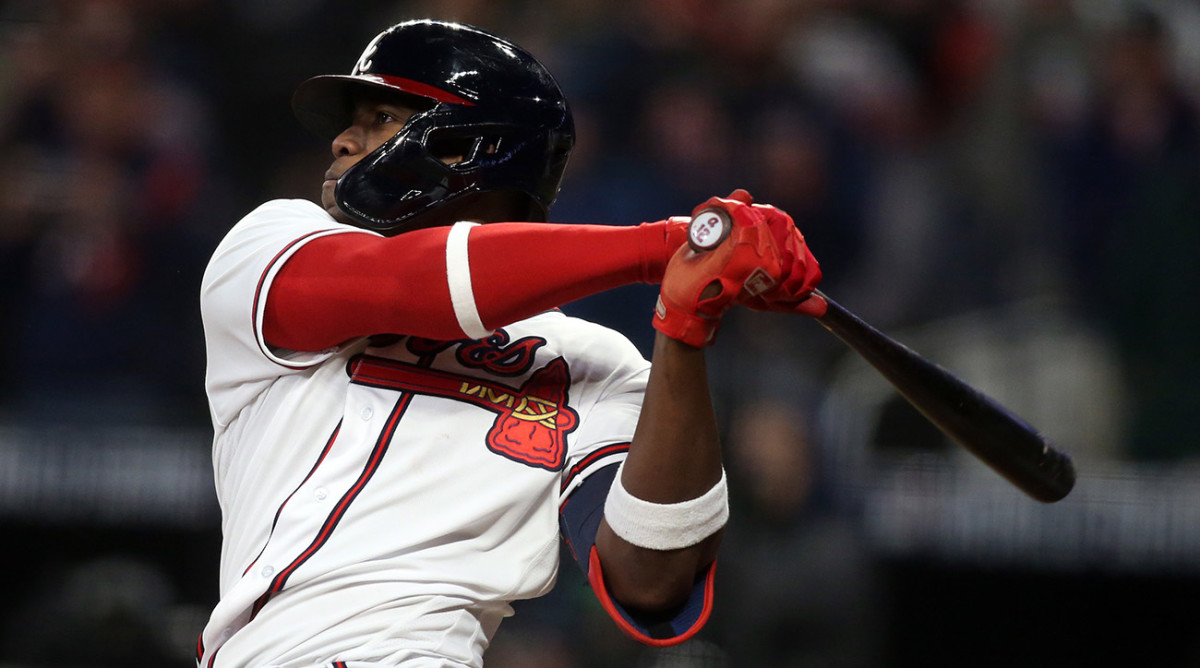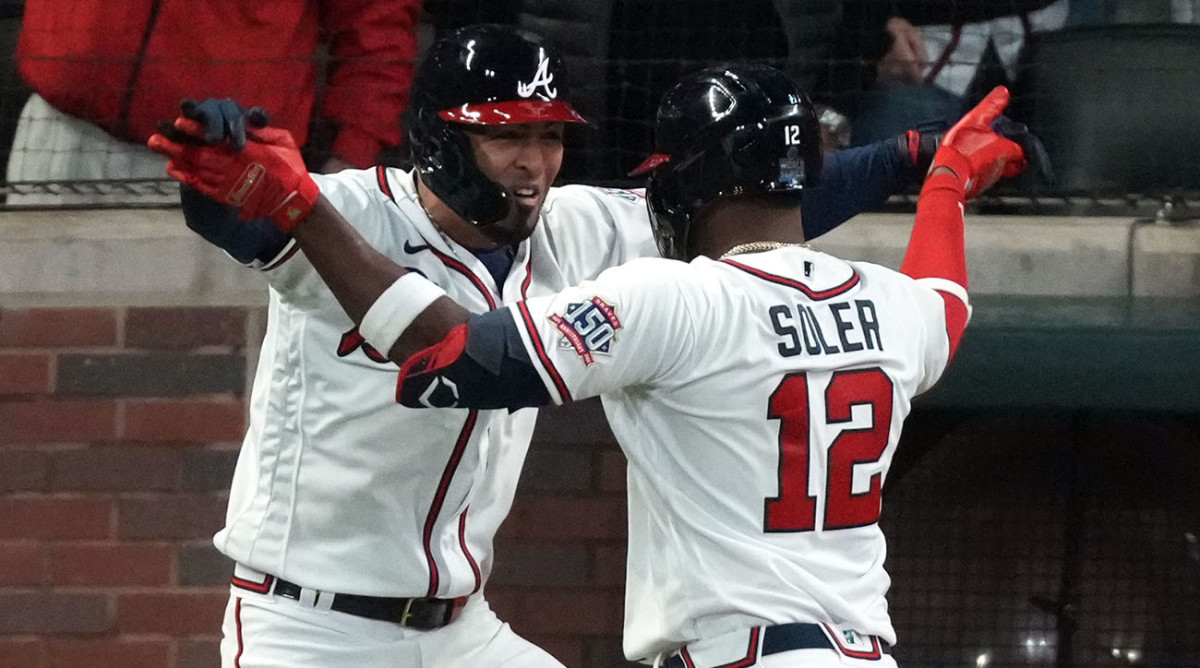Jorge Soler's Go-Ahead, Pinch-Hit Home Run Shows Value of Being the Even Man Out

ATLANTA — The pitch was a slider, hung over the plate, in the seventh inning of a tie game. Jorge Soler was ready for it. He swung, and he turned the ball into a pinch-hit, go-ahead home run.
It came directly on the heels of another home run—that one from shortstop Dansby Swanson. The twin homers helped the Braves seize Game 4 to put the team within one win of a championship. They made history, too, as only the third pair of back-to-back game-tying and go-ahead home runs in the history of the World Series. (The first such pairing? Just Babe Ruth and Lou Gehrig.) But Soler’s home run was historic all on its own. For a go-ahead playoff home run to come from a pinch hitter is rare: Soler’s was just the fourth ever in the World Series. And yet it made perfect sense for these Braves. By virtue of the way that this roster is constructed, Soler has needed to develop a taste for pinch-hitting, and so have his fellow outfielders. This was a happy accident created at the trade deadline. But it’s become a notable asset for the Braves.
“It’s so tough to do that coming off the bench in that big of a situation,” Swanson said of the pinch-hit home run from Soler. “But I feel like he’s been doing that all year. Right?”

The Braves’ outfield has become one of the most-buzzed-about stories of October. If it didn’t look like the most significant project of the trade deadline at the time, a few months later, it’s hard to see it as anything else. By now, the story is probably familiar. Rookie center fielder Cristian Pache floundered in his first MLB season. Marcell Ozuna was arrested on May 29 for allegedly assaulting his wife, and he is currently on administrative leave. Injuries to Pache, Ender Inciarte and Guillermo Heredia ripped apart a damning lack of depth. When Ronald Acuña Jr., who was in the middle of an MVP-caliber season, tore his ACL in July and was done for the year, it looked like the team might fold and look toward next season.
Instead, Atlanta traded for Soler, Eddie Rosario, Adam Duvall and Joc Pederson. Yet because the team was interested in stockpiling options, that made four fielders instead of three, and the Braves are in the NL, where they don’t have the privilege of a designated hitter. That means one of the four has always had to be the odd man out and come off the bench.
That’s hardly unusual on its own: A fourth outfielder is entirely normal. But it is strange to have four new outfielders joining the team at the same time when all are used to playing every day. That’s a complicated dynamic to navigate. It’s a quandary for a manager in terms of strategy just as much as personnel management—play the right matchups, assign the right playing time and also, somehow, try to make sure no one suffers a bruised ego or watches their performance backslide.
“It’s not an easy thing to do,” Braves skipper Brian Snitker said of the four outfielders cycling in and out of the lineup. “These guys were kind of everyday players, and coming off the bench is one of the hardest things to do in our game. But these guys have made a huge impact in our postseason when they haven’t started.”

Snitker did not have advance notice this summer that he would be given this too-much-of-a-good-thing dilemma. The trade for Pederson happened first, two weeks before the deadline, and he knew that the front office had been targeting Duvall. But Snitker thought he might get only one other outfielder outside of that pair—not two. “It was happening so fast,” Braves general manager Alex Anthopoulos said earlier this week. “I didn’t get a chance to fill Snit in.”
This meant that there was no space for a hypothetical conversation with the manager on how he might assign playing time. Instead, the news came down to him in one fell swoop: Congratulations, the front office has fixed the outfield problem, and now you have to figure out how to roll out their solution. Snitker did have the benefit of a small grace period in one respect: Rosario was on the injured list when he was acquired, which gave Soler, who had previously served as a DH in Kansas City, a chance to adjust to playing in the field again. But Snitker still had to figure out how to balance those questions of playing time—including how to maximize production off the bench—in the important period down the stretch and into October.
“It’s a really tough situation, and these guys are all really accomplished players,” Anthopoulos said. “A lot of the guys are [pending] free agents. They all want playing time. We’re in the NL, we don’t have a DH, and he has to keep everybody engaged and happy and find a plan. I’m not involved with that, and it’s a really, really tough thing to do with new players…. But Snit, the way he handled it, and the other coaches—unbelievable.”
So how do Snitker & Co. balance all of that?
“We communicate very well,” said Braves first base and outfield coach Eric Young Sr. “That’s one of my main things I stressed when they came over: Talk to me. Tell me how you feel. Tell me how you’re doing. The first thing I had to do was make sure they understand, This is how we play the outfield here in Atlanta. And the guys were very open.”
Everyone wants to win. The Braves have communicated that this is part of how they do that—with these four new outfielders, all potential everyday starters in their own right, handled as a package, cycling in and out of the lineup as needed and working off the bench when they can be critical pinch-hitting forces. It’s required some adjustments. But it’s worked. Which is how the team ended up with Soler confident in his role coming off the bench on Saturday—and ready to hit the game-winning home run.
The Braves have a chance to close out the series in Game 5 on Sunday. As is standard for their games at home, one of their four outfielders will start on the bench. But if they do have to go back to Houston for a Game 6? They can at least take solace in the fact that in the American League park, they’ll have a DH, and room in the lineup for all four of them.
More World Series Coverage:
• The Greatest Twenty-One Days of Brian Snitker’s Life
• Four Hired Horsemen Leading Atlanta's Championship Charge
• Missed Opportunities in Game 4 Puts the Astros' Season On The Brink
• Why Does MLB Still Allow Synchronized, Team-Sanctioned Racism?
